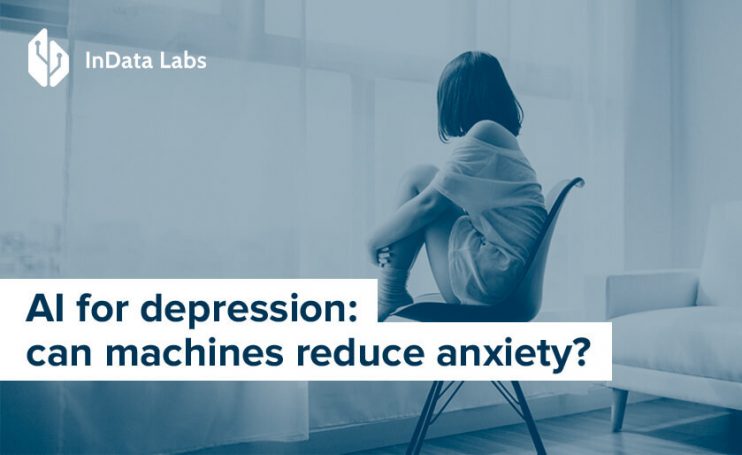AI and depression are not the words you’d combine into one sentence five years ago. Today, however, intelligent depression is making headway. AI depression apps and AI treatment are stepping in to replace imprecise dated methods to diagnose mental illnesses.
And we couldn’t have chosen a better timing. In the United States, over seven percent of adults suffer from major depression. The National Institute of Mental Health adds that it is the most common mental disorder among citizens. Besides, not everyone gets diagnosed in time or finds the proper treatment.
Today, we’ll shed some light on AI and depression. In particular, you’ll find out how medical AI technology assists mental health professionals in treating depression. We’ll also explain the benefits of intelligent systems in this field of study.
Intelligence and depression: how the two fit together
Intelligent healthcare solutions are the old news in the medical industry. Yet, depression intelligence is still taking shape.
We’ve got used to special blood tests to perform a comprehensive diagnosis. However, most conventional methods don’t identify mood disorders.

Source: Unsplash
According to Southwestern Medical Center, professors of psychiatry highlight the following diagnostics methods:
- Physical exam
- Patient Health Questionnaire (PHQ-9) screening
- Family health history
- Discussion of symptoms.
But most of those procedures rely on the jumble of subjective criteria. And this is when unbiased machine learning algorithms come in.
AI mental health: main differentiators
We built scientific progress on failure. New depression treatment technology might reduce the number of failures linked with depression markers. That is why medical institutions turn to AI developments to help organizations battle the issue. Let’s see what is so special about AI depression.
App-cessibility
The median wait time for physical appointments is around 6 days. AI depression apps, on the contrary, offer round-the-clock accessibility. Therefore, apps can accurately predict urgent conditions and slash wait times. It also means that patients get timely depression treatment in remote areas.
The AI mental health systems also gather the information that allows them to establish a therapeutic connection with users and respond appropriately. And as the machine learns from the data, involvement continues to rise.
Privacy and security
Technologies are depersonalized. It means that lots of patients will appreciate the level of anonymity medical AI technology provides. Besides, regulatory initiatives like GDPR and CCPA establish privacy policies. The former keeps your sensitive health data safe and private.
Mental health stigma
Individuals may be hesitant to answer questions regarding mental wellbeing. This is because of the stigma associated with mood disorders. The feelings of fear and shame also stop patients from getting needed help. AI-based software can detect psychological distress without such side effects.
But it doesn’t mean that computer vision software or AI apps will replace clinical treatment. Computational studies still have limitations. That is the main reason we haven’t seen the proliferation of AI-based methods in the clinic.
Intelligence and depression: AI limitations
Several clinical AI obstacles curb the awareness about the ongoing revolution. The risk-intensive nature of medicine will never grant full control to Machine learning algorithms.
The most clear limitations of Artificial Intelligence for depression include:
1.Lack of regulation
AI-powered algorithms have proved effective for physicians and patients. But, regulating these algorithms is a challenging undertaking. The U.S FDA has green-lit some assistive algorithms. Yet, no uniformity of guidelines is to come. Besides, practitioners did not create intelligent systems. Therefore, computationalists might not be competent enough to provide a comprehensive depression app.
2.Fragmented Data
Data precision in healthcare is essential to produce, link, and learn from a variety of sources. However, AI algorithms usually get tailored to a specific clinic. Therefore, another medical facility cannot implement the algorithm immediately. Today, the medicine industry still has no data infrastructure to manage the validation, deployment, and stable right-sizing of intelligent algorithms.
3.Lack of expertise
AI skills shortage also impedes the adoption of Artificial Intelligence and depression treatment. Clinicians are currently lacking in intelligent expertise and established procedures. According to a survey, only 3.8% of respondents have realized the full potential of AI. The rest of the respondents were critical of the technology’s therapeutic benefits. This mistrust can be attributed to a smattering of depression intelligence.
Now that we’ve reviewed the basics of AI depression, let’s move on to the real-world use cases.
AI treatment for depression: applications
Below are some examples of AI-based technology in existence. All applications assist mental health practitioners and patients in helping manage depression. However, these are not stand-alone treatment methods. Instead, they complement traditional therapy.
Brainwave patterns
Brain activity essentially refers to a combination of brain waves. The latter changes based on the level of consciousness and mental processes. For years, psychiatrists have been recording brain activity to detect mental disorders. This technique is now known as electroencephalography or EEG. In 1940, the very first studies of affective disorders revealed an unexpectedly large number of abnormalities in patients.
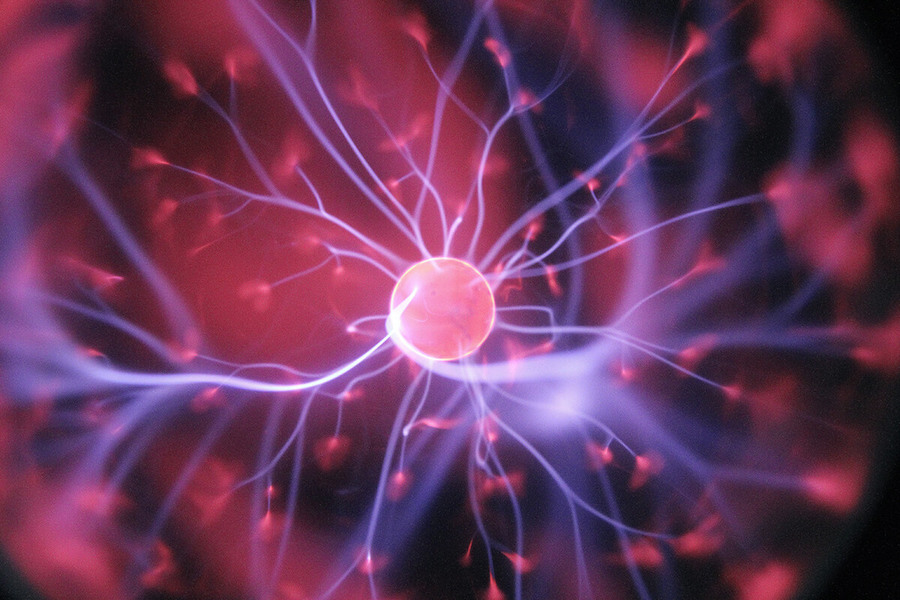
Source: Unsplash
Today, Artificial Intelligence contributes to this scientific method.
Thus, promising new research in Nature Biotechnology saw the light of the day in February. It shows that a simple AI brain test can predict whether an antidepressant will work. Under this study, the testees got either a prescribed antidepressant or a placebo for eight weeks. A special AI algorithm then analyzed the EEG data. Most of the participants had a similar brainwave pattern. It means that this part of the test subjects responded well to the antidepressant.
Overall, intelligent algorithms prove more effective than clinical factors. Thus, doctors won’t have to guess whether a drug will take effect.
AI depression applications and chatbots
Treatment options don’t boil down to traditional counseling and medication. New AI-powered alternatives provide more cost-effective and easy-to-access treatment methods. Thus, organizations can use apps for depression to improve the user’s wellbeing. The mobile apps cover a range of needs, from direct interference to post-treatment support.
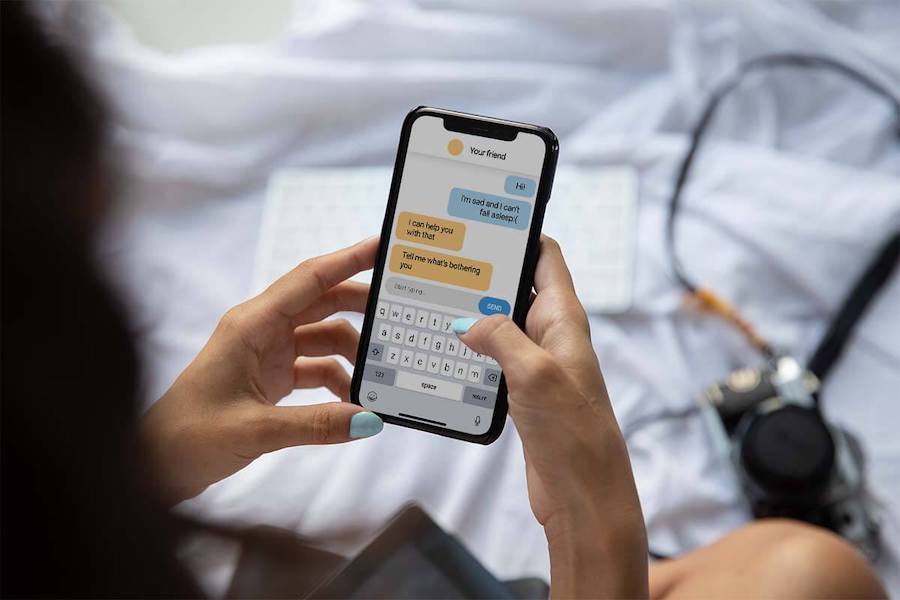
Source: Unsplash
Chatbots, for instance, can support a user based on their input. The software uses Natural Language Processing to analyze the responses, tone, and word choice. Chatbots are great options for people who are hesitant about physical sessions. Replika, Woebot, and Youper are among the most prominent examples in the niche.
Face recognition for depression detection
Facial recognition for medicine allows physicians to diagnose genetic, medical, and behavioral conditions. But, extraction of facial features to diagnose depression is a novel approach. Hence, it hasn’t gained ground yet but lights the way for researchers.
Thus, the National Center for Biotechnology Information has published two studies on the subject. In April, Chinese researchers used Deep Neural Networks to recognize depression.
They first created a dataset by asking participants to perform mood-elicitation tasks. Then researchers collected audio and video content to extract 2D and 3D appearance features with DBN models. The final decision result stems from the two models combined.
In 2019, a group of scholars also used AI to assess the Depression Anxiety Stress Scale (DASS) levels. Facial Action Coding System scanned facial expressions through a unique noninvasive architecture. The results were encouraging. Scholars achieved over 87% accuracy for depression and over 90% for stress.
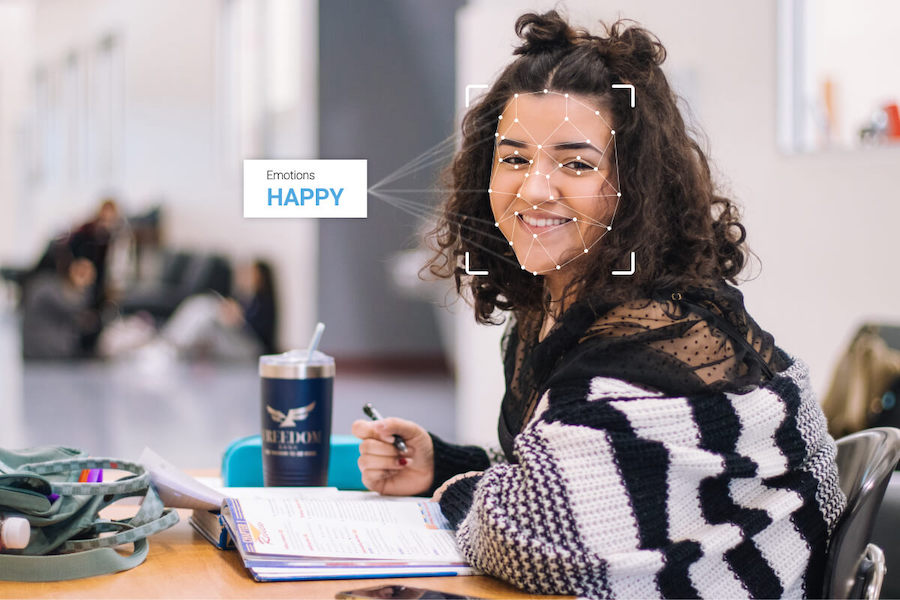
Source: Unsplash
On top of it, emotion analysis for mood disorders also allows for real-time analysis. It helps tag and derive cognitive-affective states from human facial expressions and speech. The information can also get inferred from pose estimation and physiological data.
Text and voice recognition
Text and written language also hold huge potential for intelligence and depression. AI-powered systems can scan and flag linguistic markers that refer to emotional instability.
Specialists at IBM contributed to exploring the capabilities of AI recognition. To uncover patterns in speech, researchers are combining transcripts and audio inputs with ML approaches. Clinicians can use this technology to predict and monitor schizophrenia, mania, and depression in the future.
Suicide prevention
Feelings of depression or mental disturbance can trigger suicidal thinking. Earlier, suicide prevention relied mostly on doctors’ experience and clinical records. But with AI and Big Data, mental healthcare professionals will detect suicidal behavior.
Thus, the software locates patterns to produce risk algorithms. The latter can then predict suicide outbreaks and identify at-risk individuals or populations.
A team from the University of Southern California has built an intelligent algorithm to investigate social connections. The software aimed at identifying individuals who could watch out for their friends. With an emergency, those gatekeepers could refer the patients to help.
AI in medical technology: no longer a dark horse
Medicine has always been facing the diagnostic challenge. But for mental health, the stakes are even higher. Untimely depression diagnosis plagues psychiatrists and leads to life-and-death conditions.
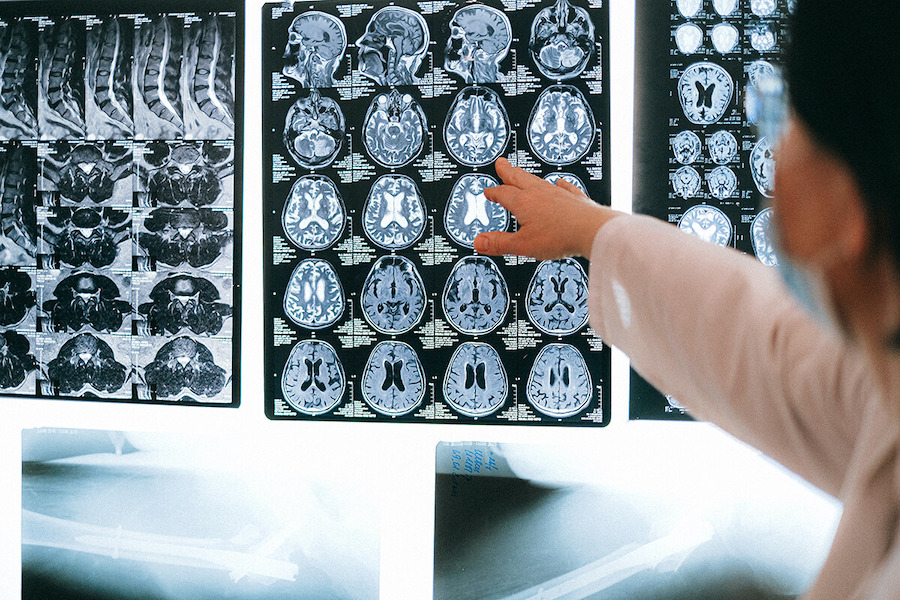
Source: Unsplash
However, Artificial Intelligence and depression applications can reduce depression rates and improve mental states. And although AI and depression haven’t developed stable symbiosis yet, we have made a start.
Thus, mental mobile applications and chatbots are now the most popular embodiments of intelligent diagnosis. Facial recognition and brain wave patterns have also shown promising results. Therefore, we can safely say that intelligent psychiatry is on its way.
Find your trusted artificial intelligence partner
Need AI experts to help you implement top-notch technologies? Schedule a call and we will consult you on how your company can benefit from our collaboration.
